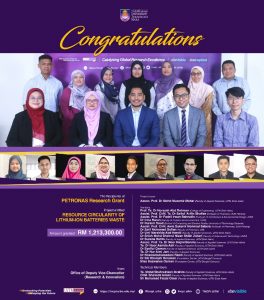
Lithium-ion batteries, the most significant candidates for energy storage devices, have quickly dominated the global electrical consumer market due to their relatively high energy density, advanced operating voltage, and lack of a memory effect.
The global market for lithium-ion batteries is forecasted to increase from USD 41.1 billion in 2021 to USD 116.1 billion by 2030, where the compound annual growth rate (CAGR) is projected to grow by 12.3 % from 2021 to 2030 (Markets and Markets, 2021).
Factors such as the declining lithium-ion battery prices and the increasing demand for batteries from the automotive industry are expected to drive the Malaysian battery market during the forecast period.
“The battery market in Malaysia is projected to reach a CAGR of about 5.28% between 2022 and 2027 according to a recent report. This means that the demand for lithium will also increase in the future. However, the amount of lithium in the world is depleting and cannot meet the market demand. Hence, there is a need to develop or improve the current established method to recycle lithium from waste lithium-ion batteries.” -Assoc. Prof. Dr Mohd Muzamir Mahat of Faculty of Applied Sciences (Project leader)
The 18-month project funded by PETRONAS Research will focus on analysing the circularity of LiBs resources and carry out Proof-of-Concept testing of the most feasible LiBs green recycling process. Also, an analysis of the regional prospect of lithium-ion battery recycling from a life cycle assessment (LCA) perspective will be conducted. At the end of the project, the suitability of upscaling the recycling of lithium and other potential elements like nickel, cobalt, or cadmium from the lab to bench scale using uncommercialized methods will be determined.
“This project is driven by a synergistic team composed of materials scientists, chemists, electrochemists, biologists, chemical engineers, environmentalists, and sustainable scientists who will work on determining the feasibility of the lithium-ion battery recycling process in Malaysia using the green method” – Professor Norazah, Deputy Vice-Chancellor (Research & Innovation) who is also the co-researcher of the project.
The project is led by UiTM researchers in collaboration with other universities including International Islamic University Malaysia (IIUM), Universiti Putra Malaysia (UPM), University Technology of Sarawak (UTS), Universiti Malaya (UM), and Universiti Sains Islam Malaysia (USIM).
The development of this lithium recycling device is in line with the 12th Malaysia Plan in its bid to become a carbon-neutral nation by as early as 2050. Apart from that, the project is also aligned with Sustainable Development Goal no 13 which aspires to fight climate change such as the increasing global temperature, rising sea levels, ocean acidification, and other consequences of global warming, which we are already experiencing.
